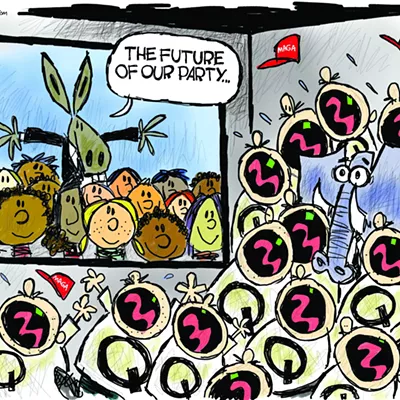The Cook Political Report (cookpolitical.com) says the seat is in play. Congressional Quarterly says it's up for grabs. And last week, columnist Robert Novak predicted a Democratic win.
Ladies and gents, we've got a real race on our hands: six Democrats, five Republicans, a Libertarian who happens to be the grandfather of the party, and Jay Quick, an independent whose name makes him sound like he's a member of the Justice League of America.
The field will narrow to four candidates in less than two weeks, when voters decide the Sept. 12 primary.
On the Democratic side, two of the six candidates were competitive as early voting started, according to a Tucson Weekly/Wick Communications poll released last week. Former state lawmaker Gabrielle Giffords had the support of 45 percent of 300 Democrats surveyed, while former newscaster Patty Weiss had the support of 27 percent.
With 20 percent of surveyed voters saying they remained undecided, the numbers didn't look good for other candidates, who remained mired in single digits. Gulf War vet Jeff Latas was the next highest at less than 6 percent, while the other three--TUSD board member Alex Rodriguez, attorney Bill Johnson and former federal bureaucrat Francine Shacter--were all polling at less than 2 percent.
It's similar to the end result four years ago in Congressional District 7, when eight candidates joined the stampede to win a newly created congressional seat. On Election Day, former Pima County supervisor Raul Grijalva emerged triumphant, with 41 percent of the vote, followed by former state lawmaker Elaine Richardson with 21 percent. None of the other half-dozen Democrats captured more than 6 percent of the vote.
Margaret Kenski, who conducted the Weekly's poll, expressed surprise at the size of Giffords' lead, but added that the race isn't over.
"Campaigns are about changing numbers," Kenski says.
It's no surprise the Giffords and Weiss have emerged as the front-runners. Giffords, 36, has been working the Democratic Party circuit since the late '90s, while Weiss spent three decades as part of a top-rated KVOA Channel 4 news team. Both are recognized by voters, put on a good show at forums and know a thing or two about the razzle-dazzle of politics.
Giffords has been positioning herself for bigger things since she climbed into the political arena. A Tucson native, Giffords attended University High (class of '88) before earning a bachelor's degree in sociology and Latin American history at Scripps College in California and a master's in regional planning at Cornell University. She gave up a job at Price Waterhouse in New York in 1996 to return to Tucson and take over the family's El Campo Tire business.
After about four years in the tire biz, Giffords helped negotiate the sale of El Campo to a national chain and started dabbling in politics. She won a seat in the state House of Representatives in a midtown swing district in 2000, and when lines were redrawn for the 2002 election, became the youngest woman in Arizona history to win a state Senate seat. After winning re-election in 2004, she resigned from the seat late last year to concentrate on her congressional run.
Giffords has run a by-the-books campaign. She's landed the lion's share of endorsements, with support from teachers, cops, firefighters, unions, environmentalists and newspapers (including the Weekly). She's tapped both local and national connections for cash, raising more than $861,000 through June 30, which has allowed her to run effective television and mail campaigns. And she has an army of volunteers in the field, knocking on doors in the district.
The only person standing in the way of the party nomination is Weiss, who is making her debut on the political stage.
Weiss, who left Channel 4 on an awkward note last year after management replaced her with a younger woman on the 6 p.m. newscast, set her sights on a new career in politics after Kolbe retired, announcing she's always been a "great fan of democracy."
Thanks to her long on-air career, Weiss, 56, has an extraordinary name ID, but whether that will translate into support at the polls remains to be seen.
As of June 30, Weiss had raised about $320,000 and collected a smattering of endorsements, mostly from individuals such as Pima County Supervisor Sharon Bronson, South Tucson Mayor Jennifer Eckstrom, former Pima County Democratic Party chairman Paul Eckerstrom, former Tucson Mayor Tom Volgy and former CNN anchor Lou Waters.
Weiss campaign spokesman Andrew Myers, who joined the campaign after a stint in Gov. Janet Napolitano's administration as a speechwriter, readily admits that Giffords' numbers are good in the city of Tucson, particularly in her legislative district, but argues that Weiss has better support in the rural area of the district. The Weekly's poll numbers showed that Weiss has the support of 43 percent of the voters in Cochise and Santa Cruz counties, while Giffords was polling at 23 percent.
Myers also points out that the poll targeted voters who had cast ballots in the 2002 and 2004 Democratic primary. He predicts that with a higher turnout this year, Weiss will fare better among less hard-core voters.
When it comes to the issues, Giffords and Weiss don't differ all that much. Both want to secure the border and create guest-worker programs; both favor allowing immigrants who have been in the country for some years to remain in the United States if they are otherwise law-abiding and register with the government.
Both want a staged withdrawal in Iraq, with troops home by the end of 2007. Both are pro-choice; they oppose parental-consent requirements and restrictions on late-term abortions. Both support federal funding for stem-cell research. Both talk about renewable energy sources and see global warming as a threat. Both oppose drilling in Arctic National Wildlife Refuge.
But Giffords has one thing that Weiss doesn't have: a voting record. Giffords has earned high marks from environmental groups, Planned Parenthood and other lefty organizations, ho-hum rankings from business groups and low grades from social conservatives.
But she's also taken some votes--and missed others--that have drawn fire from Weiss.
One of those missed votes resulted in the biggest misstep of the Giffords campaign. After Giffords ran a TV ad that declared she had used a parliamentary move to block the introduction of a stingy GOP budget proposal, the Weiss campaign pointed out that Giffords left town later that same week and missed an opportunity to kill the budget bill in the Senate Appropriations Committee.
Weiss has also criticized Giffords for not using the state's Clean Elections program--which proved to be a smart move for Giffords, since it gave her a fundraising base when she launched her congressional run.
Giffords says she didn't draw significant opposition in her last two races, so there was no reason to take public funds for her campaigns. But like Weiss, she supports public financing for federal elections.
If there's one thing Republican Randy Graf has done in CD8, it's capture a base among Republican voters. A two-term state lawmaker, Graf, 47, decided to take on Kolbe in the GOP primary in 2004 rather than run for a third term. He lost, getting less than 43 percent of the vote, but the campaign established him as the front-runner when Kolbe announced his retirement. The Weekly poll showed that 36 percent of the voters were supporting him, compared to 13 percent for his nearest challenger, state Rep. Steve Huffman, and 10 percent for Mike Hellon, a former state party chairman. Judging from the Weekly poll, Huffman and Hellon are splitting the anti-Graf vote.
Graf's numbers are particularly impressive when you consider that he hasn't had much success raising money. In his most recent FEC report, Graf reported raising $292,000, but he'd spent all but $50,000, which has left him without the resources to do much in the way of television advertising or even direct mail.
Graf's main issue is border security, which is the key issue for Republicans in CD8; the Weekly poll showed that 60 percent of Republicans identified it as their top concern. Graf wants to see the border secured before establishing any guest-worker program and says the estimated 12 million illegal immigrants now in the country should be deported.
But the border isn't Graf's only issue. He preaches the conservative line across the board. He opposes abortion except when the life of the mother is in danger, saying even victims of rape and incest should not be allowed to terminate their pregnancies. He is a strong proponent of gun rights; a bill he sponsored in the state Legislature that would have allowed guns in bars got him featured on The Daily Show. Citing his Christian faith, he supports the teaching of creationism alongside evolution in science classes.
As a result, Graf does well among voters who identify themselves as "very conservative," landing the support of more than 47 percent of them in the Weekly poll. (Another 35 percent were undecided, while less than 9 percent supported Huffman and less than 8 percent supported Hellon.) The poll also showed that Graf plays better in Cochise County, where he has the support of almost 53 percent of voters, than in Pima County, where 32 percent said they were supporting him. Huffman and Hellon aren't breaking 6 percent in Cochise County.
But Graf beats his opponents among other Republicans, too; 31 percent of Republicans who identified as "somewhat conservative" also support Graf, while more than one out of four who identify as moderate to liberal support him. Compare that to Huffman, who had the support of 13 percent of somewhat conservative GOP voters and 21 percent of moderate/liberal Republicans; or Hellon, who had the support of 15 percent of somewhat conservative voters and 9 percent of the moderate to liberal Republicans.
Huffman, who has spent eight years representing Tucson's northwest side in the state House, has packaged himself as a conservative for his congressional campaign. But whether he can sell that image remains to be seen. Although he's worked to lower income and property taxes, Huffman has leaned liberal on social issues, such as abortion and gay rights.
Until this year, Huffman, 37, tended to vote against border-security bills that conservative lawmakers introduced. In his congressional campaign, he says border security needs to be worked out hand-in-hand with a guest-worker program and says illegal immigrants now in the country should be offered an opportunity to remain if they register with the government.
Huffman remains the favorite among the big wallets in the GOP. In his last Federal Election Commission filing, he reported raising more than $506,000 as of June 30, with big donations coming from the likes of Jim Click and Don Diamond.
Huffman has landed Kolbe's endorsement, as well as the support of newspapers (including the Weekly).
To gain ground against Graf, Huffman went on the attack with mailers and TV ads calling Graf irresponsible and extreme. Huffman was the only GOP candidate, for example, to take a shot at Graf when news broke that his then-campaign manager, Steve Aiken, had been convicted in a Pennsylvania case involving sex with two teenagers in his Christian counseling program.
Graf fired Aiken after the news broke, but says his former political ally may have been wrongly accused.
"I was aware that Steve (Aiken) had that in his past," Graf says. "Obviously, the salaciousness of the event that was brought out in that article made it fodder for the Huffman campaign to take advantage of. ... I know Steve (Aiken) to be an upstanding individual."
Graf says the Huffman should "stick with the issues."
Whether Huffman's attacks will bring down Graf's numbers or improve his own remains to be seen, but the Huffman campaign suffered its own blow last week when state Sen. Toni Hellon filed a lawsuit alleging that Huffman's treasurer, real estate agent Bill Arnold, had been sneaking around her home taking photos for a Web site that criticized her for using campaign funds for a home makeover.
Arnold, while saying the charges are "politically motivated and baseless," stepped down from the campaign the same day the lawsuit was filed. (See Page 11 in this week's Currents section for more details.)
The allegations against Arnold are even more curious, because Huffman is also running against Mike Hellon, who happens to be Toni Hellon's ex-husband.
Hellon, who has yet to attack Graf, has his own base among party insiders, but he was relatively unknown among voters going into the campaign. To counter that, Hellon says he needed to do two things early in his campaign: build his name recognition and take the border issue away from Graf.
Hellon, who says he's seen few issues galvanize the electorate as much as the border has, has spent months developing a detailed plan to address security.
"This issue is so complex and has been growing through neglect for 20 years that there's no simple solution," Hellon says. "Simply stated: We need to close the border to illegal immigration."
Hellon believes the Border Patrol has the ability to do just that, but it doesn't have the resources it needs from Washington.
But like Huffman, Hellon supports allowing illegal immigrants who have not otherwise broken the law to remain in the country if they register with the government and pay a fine.
"The reason we have a problem is a magnet called availability of jobs," Hellon says. "Most of them do jobs our economy needs that are not getting filled."
Hellon, who has been a lobbyist and now works as a tax consultant, leans moderate on other issues--he favors abortion rights, although he opposes late-term abortions and supports parental consent, for example, and thinks more federal funding should be available for stem-cell research--and he's not afraid to criticize the Bush administration, especially when it comes to the Iraq war.
"I'm not prepared to debate whether we should have gone in, but I think there's no question what has happened subsequent to the fall of Saddam Hussein has been one disaster after another," says Hellon, who adds that the United States needed more troops to establish security.
"(Secretary of Defense Donald) Rumsfeld knew we would need more troops," Hellon says. "They knew it in advance, and they tried to do it on the cheap, and it's disgusting."
Hellon has run a smart campaign--he had the most effective early-voting effort, for example--but he's working with limited resources. He had raised $198,664 as June 30 (including $70,000 of his own money he'd lent the campaign), with most of the local heavy hitters writing checks to Huffman.
Although some GOP insiders encouraged him to drop out of the race to avoid splitting the anti-Graf vote, the 64-year-old Hellon says he couldn't pass up the opportunity to run.
"After looking at the field of candidates running, I didn't want to look back in a few years and wonder what would have happened if I hadn't gotten into the race," Hellon says.











